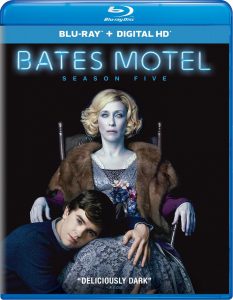The “Bates Motel” (10 p.m. Eastern Mondays, A&E) narrative has steamrolled its way into the plot of the 1960 movie “Psycho,” its source material, the past couple weeks. I was looking forward to seeing those classic scenes play out, particularly the famous “shower scene,” here starring Rhianna as Marion Crane. Then we got a twist: Norman (Freddie Highmore) doesn’t kill Marion; she emerges from the shower unscathed. Later, we do get the shower scene, but Norman’s victim is Sam Loomis (Austin Nichols, who – in the strangest bit of typecasting ever — also got stabbed to death on “The Walking Dead”).
Just a cheap trick by the writers? That thought entered my mind, but the more I think about it, I appreciate that “Bates Motel” isn’t doing a remake of “Psycho.” Plus, I now realize it was never doing a remake of the “Psycho” films; it was always a reboot. After all, the film series gave its own version of Norman’s backstory in “Pyscho IV: The Beginning” (1990). From its first episode, “Bates Motel” has not followed that backstory. Indeed, other than Norma (Vera Farmiga) and Norman, none of the characters were shared between the sagas until the recent introduction of “Psycho” characters Marion and Sam, plus ancillary players such as Marion’s boss, from whom she steals the suitcase of cash.
I had originally thought this fifth and final season of “Bates” would tell the “Psycho” story, only with fill-in-the-gaps elements owing to the fact that Norman is the main character here (in the film, it’s Marion, at least for the first act) and that there are many more supporting characters such as Emma (Olivia Cooke), Dylan (Max Thieriot), Sheriff Romero (Nestor Carbonell), Madeline Loomis (Isabelle McNally), Sheriff Greene (Brooke Smith) and Chick (Ryan Hurst).
But after Monday’s episode, “Marion” (four more eps remain), we now know “Bates” is doing its own thing – and it’s a good thing that it’s an open playing field.
At the same time, the homages to “Psycho” are a lot of fun. In addition to doing a shot-for-shot restaging of the shower scene that would make Gus Van Sant proud (split between the Marion fake-out and the actual murder of Sam), Marion’s scenes leading up to her Bates Motel visit are nods to the film – notably when she is stopped by a highway patrolman in the March 20 episode “Dreams Die First.” Here, she is pulled over because her coat is hanging out of her trunk and covering her license plate; in the film, she had pulled over because she was tired, and the patrolman questions her. But both scenes show Marion’s nervousness (Will the officer find the stolen cash?), and both linger on the blank, sunglasses-shrouded expression of the patrolman. Later, as Marion is driving toward the motel, “Bates” composer Chris Bacon mimics the tense, jerky strains of Bernard Herrmann.
These homages set us up to believe we are watching a faithful remake of Marion’s arc, which will end with the shower murder. Then we’re surprised when the events play out slightly differently. But “Bates” has been too good of a show for too long for me to dismiss this as a gimmick, especially when I consider that there are two types of audiences for the show.

It’s easy to assume that every viewer is expecting the “Pyscho” plot. However, there is a sizable second type of audience: young, Netflix-era binge-watchers who have never seen “Psycho,” and for whom everything about the “Bates” plot is fresh. For these viewers, the movie connections are not a hook, so there’s no need for the writers to treat the plot as Scripture.
Hitchcock’s classic is certainly not a lost gem; it’s very much a centerpiece of the American horror canon. Still, there is a glut of great TV and film out there, more accessible than ever, so the idea that everyone has seen every classic doesn’t apply anymore; there aren’t enough hours in the day (plus, “Psycho” is not on Netflix). And as time goes by, there will be even more people whose first exposure to the Norman Bates franchise is “Bates Motel,” not “Psycho.” They might watch the film AFTER “Bates,” and enjoy the twist of Marion being murdered rather than Sam.
I suspect these last four episodes will be an epic conclusion, whereas “Psycho” was a comparatively quiet murder mystery with one victim, Marion. While Marion escapes here, the lake near White Pine Bay is filled with corpses of Norman’s victims. I expect the writers of “Bates” to deliver a blockbuster batch of final episodes with – while carefully avoiding self-parody, of course – lots of horror elements that go beyond what we’ve seen so far. I expect Norman to kill almost all the remaining major characters, with creative stagings and reveals. Perhaps Dylan comes upon Norman doing taxidermy on Emma’s corpse.
One thing about the films that I thought was a missed opportunity was all those underused motel rooms. In “Bates,” I’d like a scene where Sheriff Greene gets a search warrant for all 10 rooms, and each room features a staged scene. Perhaps the stuffed corpses of Emma and Dylan are in one room, Madeline and Sam in another, Sheriff Romero in another. (After all, Norman can’t stash the bodies in the lake if Greene is dredging it.)
Maybe, upon discovering the grisly tableaus, Greene turns around with a shocked look and Norman says “I told you we were fully booked,” pulls out a knife and grins wickedly. This is a wilder theory, but maybe Norman’s girlfriend Cody (Paloma Kwiatkowski) – last seen in Season 2 — didn’t move to Indiana after all; maybe Norman killed and stuffed her, too.
I think Chick is the most likely to survive, as he has forged a bond with Norman. An epilogue of Chick doing a book signing for his new novel, “Psycho,” would be a fun way to put a bow on the series. (Of course, the timeline doesn’t work, as Robert Bloch’s “Psycho” came out in 1959, and “Bates Motel” is set in modern time. Additionally, while Bloch was loosely inspired by the Ed Gein murders, he did not know the man; the book’s events came wholly from his imagination. Still, Chick writing “Psycho” would be a winking way to say that the book and film are an adaptation of the “real” events seen in the TV show.)
These theories are probably off the mark, but my sparked imagination goes to show that by diverting from the “Psycho” plot, “Bates Motel” has become more vibrant. At the same time, the writers are showing appropriate respect for the source material. If Norman doesn’t do some variation on “She wouldn’t even harm a fly,” I’d be a bit disappointed.

